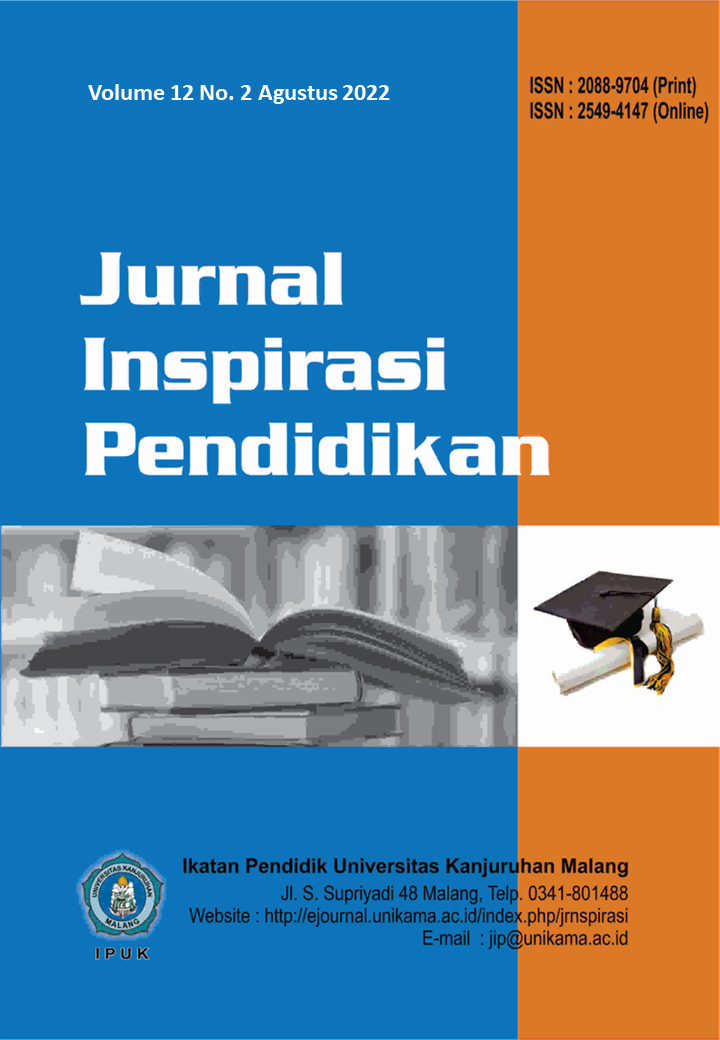Hot Topics and Frontier Evolution of Game In Stem Learning Research: A Bibliometric Mapping from 2002 to 2022
Main Article Content
Abstract
The aim of the present study is to explore the evolving trend of research directions in the field of game in STEM learning. This research uses Scopus search analysis, Microsoft Excel software, and VOS viewer software. Based on 1489 articles (488 selected documents) selected from Scopus indexed journals, co-authorship, co-citation, co-occurrence, cluster, and content analysis were conducted. The results of the quantitative analysis showed that hugely important work on games of STEM education, namely computer game and digital game base learning. The literature on games in STEM education has explored fourteen hot themes during the last couple of decades: STEM, digital game, active learning, game based learning, game, project based learning, serious game, creative self efficacy, teaching concept, learning content, industri 4.0, STEM activities, game element, and interactive learning environment. The bibliometric study conducted gives a thorough and complete picture of STEM education research that may be valuable for scholars interested in furthering future understanding in this field.
Article Details

This work is licensed under a Creative Commons Attribution 4.0 International License.
The journal allows the author(s) to hold the copyright without restrictions.
References
Buil, Isabel, Sara Catalán, and Eva MartÃnez. 2019. “Encouraging Intrinsic Motivation in Management Training: The Use of Business Simulation Games.†The International Journal of Management Education 17(2):162–71. doi: 10.1016/j.ijme.2019.02.002.
Eto, Masaki. 2019. “Extended Co-Citation Search: Graph-Based Document Retrieval on a Co-Citation Network Containing Citation Context Information.†Information Processing & Management 56(6):102046. doi: 10.1016/j.ipm.2019.05.007.
Franceschini, Fiorenzo, Domenico Maisano, and Luca Mastrogiacomo. 2016. “Empirical Analysis and Classification of Database Errors in Scopus and Web of Science.†Journal of Informetrics 10(4):933–53. doi: 10.1016/j.joi.2016.07.003.
Giannakas, Filippos, Georgios Kambourakis, Andreas Papasalouros, and Stefanos Gritzalis. 2018. “A Critical Review of 13 Years of Mobile Game-Based Learning.†Educational Technology Research and Development 66(2):341–84. doi: 10.1007/s11423-017-9552-z.
Hallinger, Philip, Ray Wang, Chatchai Chatpinyakoop, Vien-Thong Nguyen, and Uyen-Phuong Nguyen. 2020. “A Bibliometric Review of Research on Simulations and Serious Games Used in Educating for Sustainability, 1997–2019.†Journal of Cleaner Production 256:120358. doi: 10.1016/j.jclepro.2020.120358.
Krath, Jeanine, Linda Schürmann, and Harald F. O. von Korflesch. 2021. “Revealing the Theoretical Basis of Gamification: A Systematic Review and Analysis of Theory in Research on Gamification, Serious Games and Game-Based Learning.†Computers in Human Behavior 125:106963. doi: 10.1016/j.chb.2021.106963.
Liu, Zhigao, Yimei Yin, Weidong Liu, and Michael Dunford. 2015. “Visualizing the Intellectual Structure and Evolution of Innovation Systems Research: A Bibliometric Analysis.†Scientometrics 103(1):135–58. doi: 10.1007/s11192-014-1517-y.
Novia, N., A. Permanasari, R. Riandi, and I. Kaniawati. 2021. “Research on Educational Games in STEM Area 2010-2020: A Bibliometric Analysis of Literature.†. . In Journal of Physics: Conference Series IOP Publishing. 1806(1):012209.
Novia, Novia, Anna Permanasari, Riandi Riandi, and Ida Kaniawati. 2020. “Tren Penelitian Educational Game Untuk Peningkatan Kreativitas: Sebuah Sistematic Review Dari Literatur.†Jurnal Inovasi Pendidikan IPA 6(2). doi: 10.21831/jipi.v6i2.38419.
Pellas, Nikolaos, Panagiotis Fotaris, Ioannis Kazanidis, and David Wells. 2019. “Augmenting the Learning Experience in Primary and Secondary School Education: A Systematic Review of Recent Trends in Augmented Reality Game-Based Learning.†Virtual Reality 23(4):329–46. doi: 10.1007/s10055-018-0347-2.
Schöbel, Sofia, Mohammed Saqr, and Andreas Janson. 2021. “Two Decades of Game Concepts in Digital Learning Environments – A Bibliometric Study and Research Agenda.†Computers & Education 173:104296. doi: 10.1016/j.compedu.2021.104296.
Shernoff, David J., Suparna Sinha, Denise M. Bressler, and Lynda Ginsburg. 2017. “Assessing Teacher Education and Professional Development Needs for the Implementation of Integrated Approaches to STEM Education.†International Journal of STEM Education 4(1):13. doi: 10.1186/s40594-017-0068-1.
Siew, Nyet Moi, Nazir Amir, and Chin Lu Chong. 2015. “The Perceptions of Pre-Service and in-Service Teachers Regarding a Project-Based STEM Approach to Teaching Science.†SpringerPlus 4(1):8. doi: 10.1186/2193-1801-4-8.
Tober, Markus. 2011. “PubMed, ScienceDirect, Scopus or Google Scholar – Which Is the Best Search Engine for an Effective Literature Research in Laser Medicine?†Medical Laser Application 26(3):139–44. doi: 10.1016/j.mla.2011.05.006.
Trinidad, Manuel, Mercedes Ruiz, and Alejandro Calderon. 2021. “A Bibliometric Analysis of Gamification Research.†IEEE Access 9:46505–44. doi: 10.1109/ACCESS.2021.3063986.
Wang, Mengyang, and Lihe Chai. 2018. “Three New Bibliometric Indicators/Approaches Derived from Keyword Analysis.†Scientometrics 116(2):721–50. doi: 10.1007/s11192-018-2768-9.
Yan, Erjia, and Ying Ding. 2012. “Scholarly Network Similarities: How Bibliographic Coupling Networks, Citation Networks, Cocitation Networks, Topical Networks, Coauthorship Networks, and Coword Networks Relate to Each Other.†Journal of the American Society for Information Science and Technology 63(7):1313–26. doi: 10.1002/asi.22680.
Yıldırım, İbrahim, and Sedat Şen. 2021. “The Effects of Gamification on Students’ Academic Achievement: A Meta-Analysis Study.†Interactive Learning Environments 29(8):1301–18. doi: 10.1080/10494820.2019.1636089.
Ziaeefard, Saeedeh, Michele H. Miller, Mo Rastgaar, and Nina Mahmoudian. 2017. “Co-Robotics Hands-on Activities: A Gateway to Engineering Design and STEM Learning.†Robotics and Autonomous Systems 97:40–50. doi: 10.1016/j.robot.2017.07.013.
Zupic, Ivan, and Tomaž Čater. 2015. “Bibliometric Methods in Management and Organization.†Organizational Research Methods 18(3):429–72. doi: 10.1177/1094428114562629.

